Moldova–Romania relations
Moldova and Romania have experienced an exceptional relationship since Moldova's independence in 1991. Pan-Romanianism has been a consistent part of Moldovan politics, and was adopted in the Popular Front of Moldova's platform in 1992. Most of Moldova was part of Romania during the Interwar period. The official language of Moldova is Romanian. The peoples of the two countries share common traditions and folklore,[1] including a common name for the monetary unit – the leu. Early signs that Romania and Moldova might unite after both countries achieved emancipation from Soviet rule quickly faded after War of Transnistria. However, a growing unionist sentiment emerged especially in the second decade of the 21st century. While Romania remains interested in Moldovan affairs and its progress towards European integration, approximately 65% of Moldova's population is against unification.
 | |
Moldova |
Romania |
|---|---|
| Diplomatic mission | |
| Embassy of Moldova, Bucharest | Embassy of Romania, Chișinău |
| Envoy | |
| Ambassador Mihai Gribincea | Ambassador Daniel Ioniță |
Country comparison
| Moldova Republic of Moldova (Republica Moldova) |
Romania Romania (România) | |
|---|---|---|
| Flag & Coat of arms | 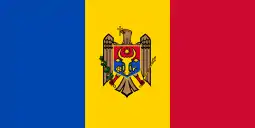  |
  |
| Population | 3,150,735 | 19,414,458 |
| Area | 33,846 km2 (13,068 sq mi) | 238,397 km2 (92,046 sq mi) |
| Population Density | 79/km2 (205/sq mi) | 81/km2 (210/sq mi) |
| Government | Unitary parliamentary constitutional republic | Unitary semi-presidential constitutional republic |
| Capital | ||
| Largest City | ||
| Official language | Romanian (also named Moldovan) | Romanian |
| First Leader | Ion Inculeț (1917–1918) | Carol I of Romania (1881–1914) |
| Current Head of Government | Prime Minister Ion Chicu (Independent; 2019–present) | Prime Minister Ludovic Orban (PNL; 2019–present) |
| Current Head of State | President Maia Sandu (PAS; 2020–present) | President Klaus Iohannis (PNL; 2014–present) |
| Main religions | 93.3% Orthodox 2.2% No Answer 1.9% Protestant 0.2% Old Believers 1.0% Catholic |
81.0% Orthodox 6.2% No Answer 4.3% Catholic 3.0% Reformed 1.8% Pentecostal |
| Ethnic groups | 75.1% Moldovans 7.0% Romanians 6.6% Ukrainians 4.6% Gagauz 4.1% Russians |
88.9% Romanians 6.1% Hungarians 3.3% Roma 0.2% Ukrainians 0.2% Germans |
| GDP (nominal) | $12.037 billion $3,398 per capita |
$261.868 billion $13,414 per capita |
| GDP (PPP) | $27.271 billion $7,700 per capita |
$576.946 billion $29,555 per capita |
| Currency | Moldovan leu (L) – MDL | Romanian leu (L) – RON |
| Human Development Index | 0.711 (high) - 2018 | 0.816 (very high) - 2018 |
Moldova–Romania border
.jpg.webp)
The Moldova–Romania border is a fluvial boundary, following the course of the Prut and Danube. This is also part of the Eastern border of the European Union, running from Criva in the North to Giurgiulești in the South. Moldova has access to the Danube for less than 500 metres, and Giurgiulești is the Moldovan port on the Danube river.
History
In 1918, at the end of World War I, Transylvania, Bukovina and Bessarabia united with the Romanian Old Kingdom. Bessarabia, having declared its sovereignty in 1917 by the newly elected Council of the Country (Sfatul Țării), was faced with bolshevik agitation among the Russian troops and Ukrainian claims to parts of its territory. The president of the Council of the Country called on the Russian Commander-in-Chief in Iași, Dmitry Shcherbachev, to send troops to protect the country. Having no troops, he transmitted the request to the Romanians, whose military intervention was met with protest by the presidents of the Council of the Country and of the provisional government of Bessarabia and by the Soviet of Chișinău.[2] Bessarabia declared independence from Russia on January 24, 1918, and, on April 9, 1918, Sfatul Țării voted union with Romania: of the 148 deputies, 86 voted for union, 3 against, 36 abstained (mostly the deputies representing the minorities, 50% of Bessarabia's population at the time[3]) and 13 were not present.
The union of Bessarabia with Romania was ratified in 1920 by the Treaty of Paris, which however was not recognized by the Russian SFSR and the United States of America (the United States abstaining due to the Treaty of Trianon).
Romania retained Bessarabia from 1918 to 1940, when it accepted a Soviet ultimatum to give up Bessarabia and Northern Bukovina. During World War II, Romania (in alliance with the Axis Powers) took back Bessarabia and was awarded further territorial gains at the expense of the Soviet Union (Transnistria; this was lost again as the tide of war turned) as compensation for Northern Transylvania, lost to Hungary in 1940.
Romanian–Moldovan SSR relations
In August 1976, Nicolae Ceaușescu, his wife, and his son were the first high-level Romanian visitors to the Moldavian SSR since World War II. The Moldavian CP First Secretary Ivan Bodiul met them at the frontier and escorted them to Chișinău. In December 1976, Bodiul and his wife Claudia arrived for a return visit of five days at Ceaușescu's invitation. Bodiul's visit was a "first" in the history of postwar bilateral relations. At one of his meetings in Bucharest, Bodiul said that "the good relationship was initiated by Ceaușescu's visit to Soviet Moldavia, which led to the expansion of contacts and exchanges in all fields."[4]
On November 5, 1978 the Stânca-Costești Hydroelectrical Plant (at Stânca-Costești) on Prut was inaugurated six years after ratification of the basic Romanian-Soviet agreement on its construction. Romania was represented by Ion Iliescu, while Bodiul represented the USSR.
A visit was paid from 14 to 16 June 1979, to the Moldavian SSR by a Romanian Communist Party delegation headed by Ion Iliescu, Political Executive Committee alternate member and Iași County Party Committee First Secretary.[4]
At the Romanian Communist Party's final conference in November 1989, Ceaușescu raised the issue of Bessarabia yet again, denouncing the Molotov-Ribbentrop Pact of 1939 and implicitly calling for the region's restoration to Romania.[5]
Recognition by Romania

Romania was the first state to recognise the independent Republic of Moldova – only a few hours, in fact, after the declaration of independence was issued by the Moldovan parliament. From the declaration of the Romanian Government made on that occasion it clearly resulted that, in the opinion of the authorities in Bucharest, Moldova's independence was considered as a form of emancipation from Moscow's tutelage and a step towards the reunification with Romania:
Proclamarea unui stat românesc independent pe teritoriile anexate cu forța în urma înțelegerilor secrete stabilite prin Pactul Molotov-Ribbentrop reprezintă un pas decisiv spre înlăturarea pe cale pașnică a consecințelor nefaste ale acestuia, îndreptate împotriva drepturilor și intereselor poporului român.[6]
[The proclamation of an independent Romanian state in the territories annexed by force following the secret agreements of the Ribbentrop-Molotov Pact represents a decisive step toward the peaceful elimination of this pact's unfortunate consequences directed against the rights and interests of the Romanian people.]
Within a few days agreements were signed for the establishment of diplomatic ties. Within a few weeks, visa and passport-free border regimes were established, allowing Romanian and Moldovan citizens to travel across the border with identity cards only. Already in 1991, Romania started donating books for Moldovan libraries and textbooks for schools and began to offer scholarships to Moldovan students to study in Romanian high schools and universities.
During the War of Transnistria, Romania was the only nation to support Moldova. Transnistria received support from Russia and Ukraine, meaning Moldovan forces were pitted not only against Transnistrian troops but also Russian cossacks and volunteers, as well as Ukrainian volunteers. Romania, however, sent a contingent of volunteers and military advisers to fight alongside Moldovan forces, as well as supplying Moldova with weapons and equipment.
On 14 April 1994, the Romanian Chamber of Deputies adopted a declaration of protest against the decision of the Moldovan Parliament in favour of accession to the CIS. The protest contained serious accusations to the legislative body of the newly established neighbouring country:
Votul Parlamentului de la Chișinău reconfirmă, în mod regretabil, Pactul criminal și anulează iresponsabil un drept al națiunii române de a trăi în integritatea spațiului ei istoric și spiritual ... Prin poziția geografică, cultură, istorie și traditii, locul natural al fraților noștri de peste Prut este, fără îndoială, împreună cu noi, în marea familie a națiunilor europene și nicidecum în cadrul unei structuri euro-asiatice. [7]
[The vote of the Parliament in Chișinău regrettably reconfirms the criminal pact and irresponsibly cancels the right of the Romanian nation to live within the integrity of its historical and spiritual space ... Through the geographical position, culture, history and traditions, the natural place of our brothers from across the Prut is, undoubtedly, together with us, in the great family of the European nations and by no means in a Eurasian structure.]
2001–08
In March 2002, the new Communist president of Moldova, Vladimir Voronin, announced that he was ending Romania's "colonial policy" towards Moldova by seeking a closer relationship with Moscow.[8]
In 2007, tension between the two governments increased in context of a resumption of Romanian program for granting some Moldovan citizens dual citizenship. In February 2007, Voronin declared that 10 million "ethnic Moldovans" were being persecuted in Romania by not being allowed to officially register as an ethnic minority.[9] Voronin's statement was criticized in harsh terms by various Romanian organizations.[10] Romanian newspaper Gândul pointed out that this alleged minority was about half the Romanian population.[11] Constantin Iordachi interpreted Voronin's statement as: "Moreover, blaming Romania’s irredenta policies, Voronin put forward his own plans for a Greater Moldova, raising territorial claims to Romania’s province of Moldova."[12]:194 A month later Voronin declared that the "Moldovan language is the mother of the Romanian language. [...] Attempts to call it Romanian, attempts to call it anything else, are attempts to cheat history and deceive one's own mother."[13] In November, Voronin accused Romania of being "the last empire of Europe".[14][15]
2009 diplomatic row
The civil unrest in Moldova in April 2009 led to a diplomatic row between the countries, after President Voronin accused Romania of being the force behind the riots in Chișinău.[16] Romania denied all charges of being involved in the protests.[16]
The Romanian ambassador in Moldova, Filip Teodorescu was declared persona non grata by the Moldovan government, being required to leave the country within 24 hours.[16] The following day, the Romanian parliament nominated a senior diplomat, Mihnea Constantinescu, as the new ambassador to Moldova,[17] but two weeks later the Moldovan government rejected him without explanation, deepening the crisis.[18]
The Moldovan government instituted visa requirements for Romanian citizens and closed the border between Romania and Moldova on 7 April. Moldovan students studying in Romania and international journalists were not allowed to enter the country. The following day, train connections between Romania and Moldova were cancelled for undefined period, because of "technical" issues.[19] Romania announced that it will not reciprocate on the expelling of the ambassador and it will keep the same visa regime, with visas free-of-charge for Moldovan citizens.[16] It also condemned as "arbitrary and discriminatory" the new measures brought against Romanian nationals in Moldova and has stated that the visa scheme was "reckless" and broke a Moldova-EU pact.[20]
The Romanian government changed the regulations that allow foreigners who had ancestors with Romanian citizenship (including most Moldovans) to gain the Romanian citizenship. The new law allows people with at least a Romanian great-grandparent (instead of just a grandparent as before) to request Romanian citizenship, while it added a maximum term of five months for giving a response to the request.[21]
On 9 February 2010, the Romanian Parliament approved a new ambassador to Moldova, Marius Lazurcă.
Dodon Presidency
Under President Igor Dodon, bilateral relations deteriorated. Throughout his presidency, Dodon never undertook an official visit to the Romanian capital of Bucharest. In March, he announced his belief that Romanians who support the unification of Romania and Moldova as the country's "number one enemy", going further in an interview with Radio Free Europe by saying that the Bucharest government supports any attempt at unionism.[22][23] Even further, Dodon, was greatly and staunchly against EU membership. Despite this deterioration, Dodon, during a meeting with President Klaus Iohannis in New York City, said that the development of Romanian relations was a "key priority" for his government.[24][25] In May 2020, during a Facebook fight with Romanian MEP Siegfried Mureșan, Moldovan Prime Minister Ion Chicu declared Romania to be the most corrupt country in Europe. Chicu's words caused controversy in Romania, with a Romanian deputy requesting the withdrawal of Chicu's Romanian citizenship. Chicu would later apologize during a meeting with the Romanian ambassador in Moldova Daniel Ioniță.[26]
Unification movement
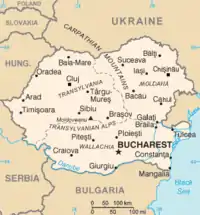
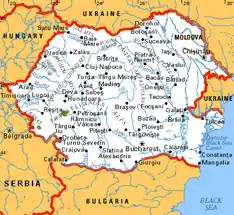
Right image: The so-called "Belkovski proposal": a political union excluding Transnistria.
A movement for the unification of Romania and Moldova began in both countries after the Romanian Revolution and the glasnost policy in the Soviet Union, advocating the peaceful integration of the two states. Individuals supporting the movement are called "Unioniști" (Unionists). In Moldova, those against the movement are called "Moldoveniști" (Moldovenists).[27] Unionist organizations in Romanian and in Moldovan civil society include "Noii Golani" (The New Hooligans),[28] "Deșteptarea" (The Awakening),[29] or the movement "Basarabia - Pământ Românesc" ("Bessarabia - Romanian Land").[30]
When the Ribbentrop-Molotov Pact was signed, the territories between the Prut and the Dniester belonged to Romania. Since the recognition of the independence of the Republic of Moldova many references were made in Romania to the necessity of eliminating the consequences of the Ribbentrop-Molotov Pact. As a matter of fact, in June 1991, Romania's Parliament adopted a declaration through which the above-mentioned Pact was declared null and void.
In the aftermath of the 2009 Chișinău riots, director of the Moscow Institute for National Strategy Stanislav Belkovsky reaffirmed his support for the movement, declaring he believes the civil unrest to be a prelude of a political union between the countries. Belkovsky had already authored another plan for the unification between Romania and Moldova, notably excluding Transnistria, which would either become an independent republic or, if it is unviable on its own, unite with Ukraine.[31]
On 29 November 2013, Georgia and Moldova signed the association agreements with the European Union at a summit in Vilnius dedicated to the EU's Eastern Partnership countries.[32] In this context, the Romanian President Traian Băsescu stated that Romania's next project of national importance is the reunification of the two countries, reunification demanded on the streets of Bucharest, Chișinău and Bălți by tens of thousands of people.[33] More than three quarters of Romanian citizens agree with an eventual union with Moldova, according to an opinion poll conducted by IRES in November 2013.[34] A press release of the Moldovan pro-union organization "Action 2012" claimed that a poll conducted in Moldova, excluding Transnistria and Gagauzia, before the annexation of Crimea by Russia in February 2014 and revealed that 52% of Moldovan citizens would want the union with Romania.[35]
In 2018, celebrating the centenary of the Great Union (the unification of Romania with Bessarabia, Bukovina and Transylvania), a demonstration called the Centenary March was organized by several Romanian and Moldovan activists for unification.[36] It started in Alba Iulia on 1 July 2018 and ended in Chișinău on 1 September 2018.[37] One of its main objectives was to achieve the unification of Moldova with Romania. The participants tried to collect 1 million signatures for the organization of a referendum.[38] Although at first the Moldovan authorities prohibited the participants to cross the border, they were allowed to enter later.[39][40]
Dual citizenship
A 2013 study by the Soros Foundation found that from the passing of the Romanian citizenship law in 1991 until the end of 2012, the number of successful applications from Moldova was 323,049.[41] This is an increase of 96,542 successful applications since 15 August 2011.[42] In the same period, the number of applications was 449,783, meaning that around 125,000 applications still need to be finalised.[41] In 2011 and 2012, 100,845 and 87,015 applications were submitted respectively.[41]
The actual number of persons granted citizenship in these applications remains unclear because each application may include minors dependent on the adult filing. The number of persons is estimated to be around 400,000, with a potential of 150,000 more persons if all outstanding applications are successful.[41]
In 2001, the EU pressured Romania to require an international passport for all Moldovan travelers. Immediately thereafter, a substantial number of Moldovans began to apply for Romanian citizenship. Unofficial data from 2001 suggested that about 200,000 Moldovans also held Romanian citizenship, despite the fact that dual citizenship was officially illegal in Moldova at the time. Due to the overwhelming number of applications, the Romanian embassy imposed a moratorium in 2002. Dual citizenship became an election issue during the 2003 local elections in Moldova. In November that year, the Moldovan parliament passed a law which allowed dual citizenship; this applied to other countries besides Romania, particularly Russia and Ukraine.[43]
Between 1991 and 2006, 95,000 Moldovans have obtained Romanian citizenship.[44] In September 2007, Romania resumed its policy of granting (or restoring as it says) Romanian citizenship to Moldovans who requested it. In response, the Communist-led Moldovan parliament passed a law (in October 2007[45]) prohibiting anyone holding dual citizenship or residing abroad from holding public office.[12]:203 In 2009, Romania granted 36,000 more citizenships and expects to increase the number up to 10,000 per month. [46][47] Romanian president Traian Băsescu claimed that over 1 million more have made requests for it, and this high number is seen by some as a result of this identity controversy. The Communist government (2001–2009), a vocal advocate of a distinct Moldovan ethnic group, deemed multiple citizenship a threat to Moldovan statehood.[48][49]
The Moldavian law limiting the political rights of dual-citizenship holders was challenged to the European Court of Human Rights in the case of Tanase v. Moldova. On 27 April 2010, the Grand Chamber of the ECHR decided the ban was "disproportionate with the government’s purpose of ensuring loyalty" of its public servants and members of parliament.[50]
One applicant interviewed by Der Spiegel said: "I want to go further West with this passport. I don't care about Romania."[51] The EU Observer wrote "Many Moldovans regard the Romanian passport as the key to the EU, according to Marian Gherman, a Bucharest prosecutor whose office has investigated a network of touts and bureaucrats who were expediting citizenship applications for money. “Everybody knows it,” he said. “They ask for Romanian citizenship only because it gives them the freedom to travel and work within the EU.” An official from the National Citizenship Authority, NCA, in Bucharest, speaking on condition of anonymity, confirmed that Moldovans had shown little interest in acquiring Romanian nationality until 2007."[52]
Gallery
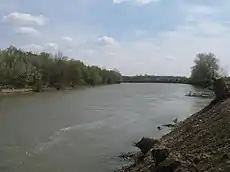
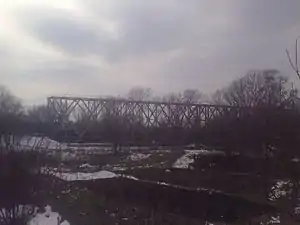 Eiffel Bridge, Ungheni, built in 1877, is the only rail crossing between Romania and Moldova.
Eiffel Bridge, Ungheni, built in 1877, is the only rail crossing between Romania and Moldova. Moldova has 1540 mm rail gauge, while Romania has standard gauge.
Moldova has 1540 mm rail gauge, while Romania has standard gauge. Romanian leu can be conveniently exchanged throughout Moldova.
Romanian leu can be conveniently exchanged throughout Moldova. Chișinău railway station timetable showing four departures to Russia and one departure to Romania.
Chișinău railway station timetable showing four departures to Russia and one departure to Romania.
 Patriotic street poster in Chișinău: "Love your language, love your country".
Patriotic street poster in Chișinău: "Love your language, love your country". Patriotic poster in Chișinău: "Republic of Moldova is my homeland".
Patriotic poster in Chișinău: "Republic of Moldova is my homeland". Graffiti in Chișinău. The original reads "We want union with Romania", but "Romania" was later painted over with "Russia".
Graffiti in Chișinău. The original reads "We want union with Romania", but "Romania" was later painted over with "Russia".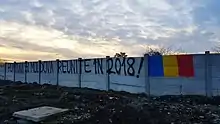 Graffiti in Bucharest. "Romania and Moldova reunited in 2018!".
Graffiti in Bucharest. "Romania and Moldova reunited in 2018!".
See also
- Foreign relations of Moldova
- Foreign relations of Romania
- Moldova–Romania border
- Moldova–EU relations
- Unification of Romania and Moldova
- Citizenship in Romania
- Controversy over national identity in Moldova
- Moldovan Embassy, Bucharest
- Moldovan Consulate General, Iași
- Embassy of Romania, Chișinău
- Romanian Consulate General, Cahul
- Romanian Consulate General, Bălți
References
- "Studiu privind identitatea națională în Republica Moldova" (PDF). Romanian Center for Studies and Strategies (in Romanian). Acțiunea 2012. March 2014. Archived from the original (PDF) on 2015-04-02.
- Anarchy in Bessarabia in Charles Upson Clark, Bessarabia, New York, 1927
- "Демоскоп Weekly - Приложение. Справочник статистических показателей". Archived from the original on 30 May 2016. Retrieved 24 April 2016.
- ROMANIAN-MOLDAVIAN SSR RELATIONS By Patrick Moore and the Romanian Section Archived 2012-02-03 at the Wayback Machine
- Charles King, The Moldovans: Romania, Russia, and the Politics of Culture, Hoover Institution Press, 2000. p. 106.
- (in Romanian) "The Romanian Ministry of Foreign Relations on the history of relations with Moldova" Archived 2012-02-27 at the Wayback Machine
- "Archived copy" (in Romanian). Archived from the original on 2009-06-26. Retrieved 2009-11-08.CS1 maint: archived copy as title (link)
- Bertil Nygren (2008). The Rebuilding of Greater Russia: Putin's Foreign Policy Towards the CIS Countries. Routledge. p. 85. ISBN 978-0-415-43600-7.
- "BBCRomanian.com". Archived from the original on 30 October 2016. Retrieved 24 April 2016.
- "Pohta lui Voronin: Moldova dodoloata". HotNewsRo. Archived from the original on 27 April 2016. Retrieved 24 April 2016.
- "Voronin denunta "persecutarea" celor "10 milioane de etnici moldoveni din Romania"". Gandul.info. Archived from the original on 1 June 2016. Retrieved 24 April 2016.
- Constantin Iordachi (2009). "Politics of Citizenship in Postcommunist Romania". In Rainer Bauböck; Bernhard Perchinig; Wiebke Sievers (eds.). Citizenship Policies in the New Europe. Amsterdam University Press. ISBN 978-90-8964-108-3.
- "Moldovan Leader Blasts Romanian 'Intervention'". RadioFreeEurope/RadioLiberty. Archived from the original on 4 March 2016. Retrieved 24 April 2016.
- "Archived copy". Archived from the original on 2011-05-23. Retrieved 2013-06-23.CS1 maint: archived copy as title (link)
- Stephen M. Saideman; R. William Ayres (2008). For Kin Or Country: Xenophobia, Nationalism, and War. Columbia University Press. p. 145. ISBN 978-0-231-14478-0.
- (in Romanian) "Voronin: România a declanșat revolta de la Chișinău" Archived 2009-04-11 at the Wayback Machine, Evenimentul Zilei, April 8, 2009
- "Archived copy". Archived from the original on 2009-04-19. Retrieved 2009-04-24.CS1 maint: archived copy as title (link) "Romania names new ambassador to neighbouring Moldova"], Southeast European Times, April 9, 2009
- "Dispute between Romania and Moldova worsens" Archived 2009-05-01 at the Wayback Machine, AP, April 24, 2009
- (in Romanian) "Două curse internaționale feroviare între România și Republica Moldova au fost anulate" Archived 2009-04-18 at the Wayback Machine, Realitatea, April 8, 2009
- "Europe | Romania slams Moldova's sanctions". BBC News. 2009-04-09. Archived from the original on 2009-04-12. Retrieved 2009-04-17.
- "Boc promite că termenul maxim de acordare a cetățeniei va fi de cinci luni", Gândul, April 15, 2009
- https://moldova.europalibera.org/a/valentina-ursu-in-dialog-cu-igor-dodon-partea-a-treia/29109939.html
- https://www.romania-insider.com/igor-dodon-romanians-enemy-unionist-movement
- https://www.urdupoint.com/en/world/romanian-leader-calls-on-dodon-to-prevent-fed-722039.html
- https://balkaninsight.com/2019/09/26/romania-opposes-federal-solution-to-moldovas-transnistria-problem/
- "Premierul moldovean Ion Chicu dă înapoi după întâlnirea cu ambasadorul român". Radio Europa Liberă România (in Romanian). 25 May 2020.
- "Unionistii trebuie pedepsiti din toate punctele de vedere" (in Romanian). Ziarul de Garda. Archived from the original on 2009-06-02. Retrieved 2009-05-16.
- "Noii Golani" (in Romanian). Archived from the original on 2009-06-02. Retrieved 2009-05-16.
- "Deșteaptă-te Române!". Archived from the original on 2009-06-02. Retrieved 2009-05-16.
- "Basarabia - Pământ Românesc". Archived from the original on 2006-10-29. Retrieved 2009-05-16.
- "Influential political scientist Stanislaw Belkovsky: Moldova begun the process of unification with Romania". Hotnews.ro. 2009-04-08. Archived from the original on 2009-04-11. Retrieved 2009-05-16.
- Dave Keating (29 November 2013). "Georgia and Moldova sign EU association agreements". European Voice. Archived from the original on 26 February 2014.
- Valentina Postelnicu (27 November 2013). "Băsescu, despre relația cu Republica Moldova: "Următorul proiect de țară pentru România este "vrem să ne întregim țara""". Gândul. Archived from the original on 5 May 2014.
- "Sondaj IRES: Trei sferturi dintre români se declară de acord cu unirea României cu Republica Moldova". HotNews.ro. 30 November 2013. Archived from the original on 3 December 2013.
- V.M. (27 March 2014). "Sondaj în R. Moldova, minus Transnistria și Găgăuzia: 52% dintre moldoveni își doresc unirea cu România". HotNews.ro (in Romanian). Archived from the original on 29 December 2014.
- "A început Marșul Centenarului: 1300 de km de la Alba Iulia la Chișinău". Cotidianul (in Romanian). 2 July 2018.
- "Marşul Centenarului începe din 1 iulie la Alba-Iulia. Cum poți străbate cele 300 de localități din România și R. Moldova în cei 1.300 km". Unimedia (in Romanian). 25 June 2018.
- Drăghici-Taraș, Iulia (8 August 2018). "Unirea Basarabiei cu România trece și prin județul Covasna". Covasna Media (in Romanian).
- "Unionistii care au pornit in marsul centenarului de la Alba Iulia au ajuns aproape de Chisinau, iar maine urmeaza sa manifeste in PMAN". ProTV Chișinău (in Romanian). 31 August 2018.
- "Patriotas rumanos y moldavos marchaban desde Iași por la unidad y son agredidos en Chișinău". El Correo de España (in Spanish). 16 September 2018.
- "Archived copy". Archived from the original on 2013-10-29. Retrieved 2014-10-12.CS1 maint: archived copy as title (link)
- "Aproape un sfert de milion de persoane din R.Moldova au redobândit cetăţenia română, în 20 de ani". Gandul.info. Archived from the original on 4 March 2016. Retrieved 24 April 2016.
- Roper, S. D. (2005). The politicization of education: Identity formation in Moldova and Transnistria. Communist and Post-Communist Studies, 38(4), 501-514 (507). doi:10.1016/j.postcomstud.2005.09.003
- "Moldova - România: vizele, nou prilej de disensiune" (in Romanian). BBC Romanian. 2007-01-05. Archived from the original on 2009-06-02. Retrieved 2009-05-16.
- DUAL CITIZENSHIP RESTRICTIONS: CONCERN WITH PUBLIC INTERESTS OR FEAR OVER OWN CITIZENS pdc.ceu.hu/archive/00003691/01/Legal_Commentaries_2007-03.pdf
- "Băsescu vrea să adopte, lunar, 10.000 de basarabeni. Gândul a fost azi la botezul a 300 dintre ei: de ce rămân studenții moldoveni în România - Gandul". Gandul.info. 2010-04-29. Archived from the original on 2012-03-10. Retrieved 2013-03-09.
- "Cetăţenia română pentru basarabeni: Redobândire sau recunoaștere?". Interlic.md. 2009-08-27. Archived from the original on 2013-09-26. Retrieved 2013-03-09.
- "Voronin acuză România că pune în pericol statalitatea Republicii Moldova" (in Romanian). Bucharest: Realitatea TV. 2007-11-06. Archived from the original on 2009-04-15. Retrieved 2008-11-19.
- Constantin Codreanu (2007-03-08). "Chișinăul spune că Bucureștiul subminează statalitatea Moldovei" (in Romanian). Bucharest: Ziarul Financiar. Archived from the original on 2012-03-14. Retrieved 2008-11-19.
- "EUDO CITIZENSHIP". Archived from the original on 8 May 2016. Retrieved 24 April 2016.
- Romanian Passports For Moldovans: Entering the EU Through the Back Door By Benjamin Bidder in Chișinău, Moldova "Archived copy". Archived from the original on 2015-11-05. Retrieved 2015-09-13.CS1 maint: archived copy as title (link)
- How to buy EU citizenship "Archived copy". Archived from the original on 2013-06-18. Retrieved 2013-06-23.CS1 maint: archived copy as title (link)
